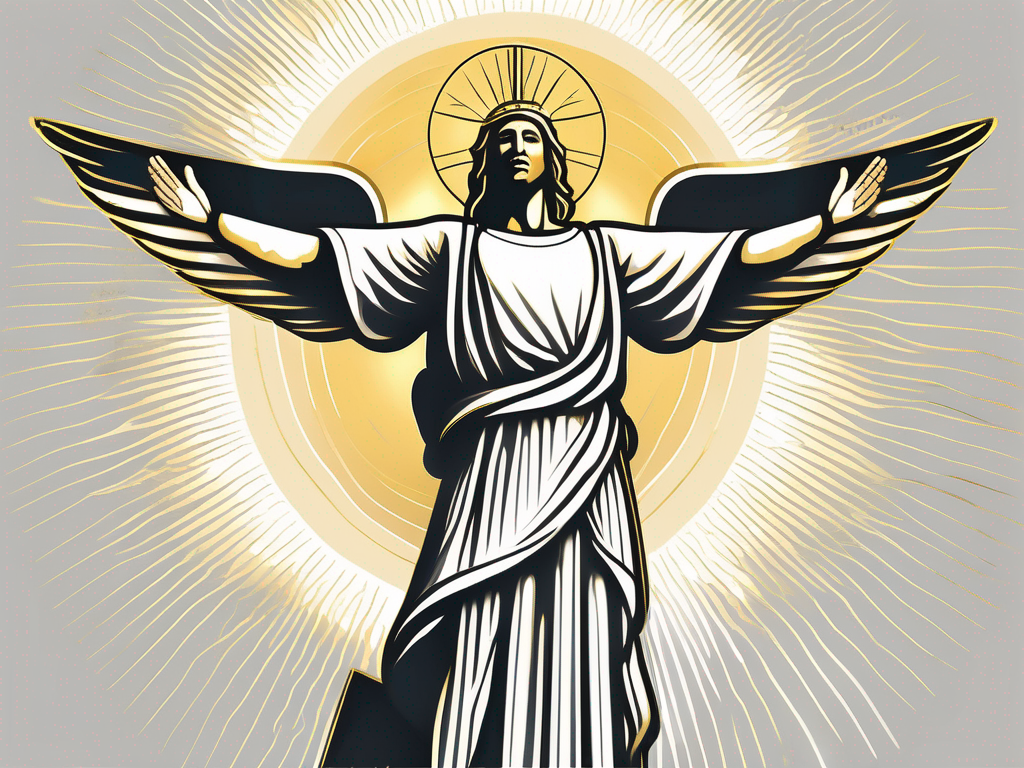Sacrifice has been a central theme in the Bible since the beginning. It is a concept deeply rooted in the religious traditions and beliefs of both the Old and New Testaments. In this article, we will explore what the Bible says about sacrifice, its purpose and meaning, the different types of sacrifices mentioned in the scriptures, the ultimate sacrifice of Jesus Christ, and how sacrifice is interpreted in modern times. So, let’s dive in!
Understanding the Concept of Sacrifice in the Bible
The concept of sacrifice in the Bible goes beyond simply giving up something valuable. It involves offering something to God as an act of devotion, obedience, or worship. Sacrifice serves as a way for believers to demonstrate their faith and commitment to God.
When we think of sacrifice, we often think of giving up something we hold dear. In the Bible, sacrifice takes on a deeper meaning. It is not just about giving up material possessions, but about offering ourselves wholly to God. It is about surrendering our desires, ambitions, and even our own lives to align with God’s will.
Throughout the pages of the Bible, we see numerous examples of sacrifice. From the story of Abraham being willing to sacrifice his son Isaac, to the widow who gave her last two coins, these stories demonstrate the profound impact that sacrifice can have on our relationship with God.
The Old Testament and Sacrifice
In the Old Testament, sacrificial rituals were a fundamental part of the worship practices of the Israelites. The book of Leviticus provides detailed instructions on various types of sacrifices, such as burnt offerings, peace offerings, and sin offerings. These sacrifices often involved the shedding of blood and the offering of animals as a symbolic representation of repentance and seeking forgiveness from God.
The sacrificial system in the Old Testament served as a way for the Israelites to approach God and seek reconciliation. It was a tangible way for them to acknowledge their sins and express their desire to be in a right relationship with God. The act of sacrificing an animal was not meant to be a mere ritual, but a heartfelt expression of repentance and surrender.
Each type of sacrifice had its own significance and purpose. The burnt offering, for example, was a voluntary act of worship, symbolizing complete surrender to God. The peace offering, on the other hand, was an expression of gratitude and fellowship with God and others. The sin offering was a means of atonement, a way for the Israelites to seek forgiveness for their transgressions.
The New Testament and Sacrifice
With the arrival of Jesus Christ, the New Testament brings a new perspective on sacrifice. Jesus himself became the ultimate sacrifice, offering his life on the cross as a ransom for humanity’s sins. His sacrifice is seen as the fulfillment of the Old Testament sacrificial system, putting an end to the need for animal sacrifices and offering eternal redemption for all who believe in him.
Jesus’ sacrifice on the cross is a demonstration of God’s immense love for humanity. It is through his sacrifice that we are reconciled with God and offered the gift of salvation. Jesus’ sacrifice is not just a historical event, but a present reality that continues to transform lives today.
As followers of Christ, we are called to live sacrificial lives. This means that we are to offer ourselves as living sacrifices, holy and pleasing to God (Romans 12:1). We are to imitate Christ’s sacrificial love by serving others, putting their needs before our own, and being willing to give up our own comfort and desires for the sake of the Kingdom of God.
Understanding the concept of sacrifice in the Bible is not just about gaining knowledge, but about embracing a way of life. It is about recognizing that true fulfillment and purpose are found in surrendering ourselves to God and living in obedience to his will. May we continually strive to live sacrificially, following the example of Christ, and experiencing the abundant life that comes from walking in his footsteps.
The Purpose and Meaning of Sacrifice
Why did God require sacrifices from his people? The purpose of sacrifice in the Bible can be understood from two main aspects: atonement for sins and an act of worship.
When we delve into the concept of sacrifice as atonement for sins, we find that throughout the Old Testament, sacrifices were offered to seek forgiveness for sins and restore a right relationship with God. The shedding of blood symbolized the seriousness of sin and the need for a sacrifice to appease God’s justice. The act of sacrifice was not taken lightly, as it required the offering of something valuable, often an animal. This act of surrendering a precious possession demonstrated the sincere desire for forgiveness and reconciliation with God. Sacrifice was a means of obtaining cleansing and reconciliation with God, allowing individuals to experience the freedom and joy of a restored relationship.
However, sacrifice was not solely about atonement. It also served as an act of worship, allowing believers to express their devotion and gratitude towards God. By offering sacrifices, people demonstrated their understanding of God’s sovereignty and provision. It was a tangible way to acknowledge God’s goodness and faithfulness in their lives. The act of sacrifice required individuals to set aside their own desires and preferences, humbling themselves before God. It was a way to show trust in God’s guidance and provision, recognizing that everything they had came from Him. Sacrifice, therefore, was not just a ritualistic practice but a heartfelt expression of worship, an opportunity to honor God and deepen the relationship between the Creator and His people.
In addition to its spiritual significance, sacrifice also played a practical role in the lives of the people. The act of offering sacrifices required careful preparation and attention to detail. It involved selecting the appropriate animal, ensuring its purity and suitability for sacrifice. This process required individuals to be intentional in their actions, fostering a sense of discipline and reverence. Sacrifice became a way to teach obedience and commitment, as individuals had to follow God’s instructions precisely. Through this obedience, believers learned the importance of following God’s commands and the blessings that came from living in alignment with His will.
Furthermore, sacrifice served as a communal activity, bringing people together in worship and unity. It provided an opportunity for individuals to gather and participate in a shared experience of devotion. Sacrificial ceremonies were often held in sacred spaces, such as temples or altars, creating a sense of sacredness and awe. The act of sacrifice became a unifying force, strengthening the bond between believers and fostering a sense of belonging within the community. It was a reminder that they were part of something greater than themselves, a chosen people called to live in fellowship with one another and with God.
In conclusion, the purpose and meaning of sacrifice in the Bible encompassed both atonement for sins and an act of worship. Sacrifice was a way to seek forgiveness, restore a right relationship with God, and experience the joy of reconciliation. It was also an opportunity to express devotion, gratitude, and trust in God’s sovereignty. Sacrifice taught obedience, discipline, and unity within the community of believers. Through the act of sacrifice, individuals were able to deepen their understanding of God’s love and provision, finding solace and purpose in their faith.
Different Types of Sacrifices in the Bible
The Bible mentions various types of sacrifices carried out by the Israelites. These sacrifices were not just rituals, but rather meaningful acts of devotion and worship. Each type of sacrifice had its own significance and purpose, reflecting the deep spiritual connection between the Israelites and God.
Burnt Offerings
Burnt offerings were an integral part of the sacrificial system in ancient Israel. They were completely consumed by fire on the altar, symbolizing total surrender and dedication to God. The act of offering a burnt offering represented the desire to be completely consumed in God’s service, to give oneself entirely to Him. It was a way for the Israelites to express their devotion and commitment to God, acknowledging His sovereignty and lordship over their lives.
When an individual or a community brought a burnt offering, it was an act of worship and submission. By offering the sacrifice, they acknowledged their dependence on God and their desire to live in accordance with His will. The burnt offering was a tangible expression of their faith and trust in God, as they believed that He would accept their offering and bless them in return.
Peace Offerings
Peace offerings were voluntary expressions of gratitude and thanksgiving towards God. They were a way for the Israelites to celebrate and share in the blessings that God had bestowed upon them. The peace offering was not just a ritual, but a communal meal shared by the offeror and the priests. This meal symbolized fellowship with God and with one another, emphasizing the importance of community and unity.
When an individual brought a peace offering, it was an act of celebration and joy. It was a way for them to express their gratitude for God’s faithfulness and provision in their lives. The peace offering was a time of feasting and rejoicing, as the offeror and their family and friends gathered together to partake in the meal. It was a moment of unity and fellowship, where they could experience the goodness of God’s presence and the blessings of His provision.
Sin and Guilt Offerings
Sin and guilt offerings were an essential part of the sacrificial system in ancient Israel. They were offered to atone for specific sins committed unintentionally or knowingly. These sacrifices sought forgiveness and cleansing from God for individual and community transgressions. The sin and guilt offerings were a way for the Israelites to seek reconciliation with God and restore their relationship with Him.
When an individual or the community brought a sin or guilt offering, it was an act of repentance and seeking forgiveness. They acknowledged their wrongdoing and sought to make amends with God. The offering served as a means of atonement, a way for the Israelites to find forgiveness and restoration. It was a solemn and humbling experience, as they recognized their need for God’s mercy and grace.
The sin and guilt offerings were not just about seeking forgiveness, but also about learning from their mistakes and striving to live in accordance with God’s commandments. It was a reminder of the importance of obedience and the consequences of sin. Through these sacrifices, the Israelites sought to grow in their faith and deepen their relationship with God.
Jesus Christ: The Ultimate Sacrifice
The pinnacle of sacrifice is found in the person of Jesus Christ. His sacrifice on the cross is considered the ultimate offering and a demonstration of God’s unconditional love for humanity.
The Significance of Jesus’ Sacrifice
Jesus willingly laid down his life as a perfect and blameless sacrifice to atone for the sins of humanity. Through his sacrifice, he provided a way for all people to be reconciled with God and receive eternal salvation.
The Impact of Jesus’ Sacrifice on Christian Beliefs
Jesus’ sacrifice has had a profound impact on Christian beliefs and practices. It serves as the foundation of the Christian faith, emphasizing the importance of faith in Jesus as the only path to salvation. His sacrifice also highlights the value of selflessness, love, and serving others in the life of a believer.
Modern Interpretations of Biblical Sacrifice
Today, the concept of sacrifice is interpreted in various ways by different Christian traditions and individuals:
Sacrifice in Contemporary Christian Practices
In contemporary Christian practices, sacrifice can be understood as giving up personal desires and ambitions for the sake of serving God and others. It can involve acts of charity, volunteering, or practicing self-discipline in order to grow spiritually and align one’s life with biblical principles.
Theological Perspectives on Sacrifice Today
From a theological standpoint, sacrifice is seen as a continual process of surrendering one’s will to God and living a life that mirrors Christ’s sacrificial love. It is an ongoing journey of transformation and a response to God’s grace and mercy.
In conclusion, the Bible highlights the significance of sacrifice in the lives of believers. It conveys the idea that sacrifice is not merely about giving up something valuable; rather, it is a profound expression of faith, worship, and devotion to God. Whether through the rituals of the Old Testament or the ultimate sacrifice of Jesus Christ, the Bible encourages believers to embrace sacrificial living as a way to honor God and seek his guidance in their lives.












